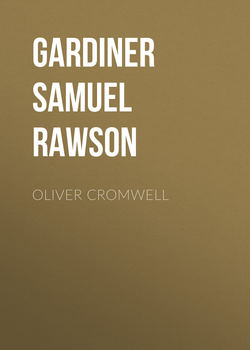Oliver Cromwell

Реклама. ООО «ЛитРес», ИНН: 7719571260.
Оглавление
Gardiner Samuel Rawson. Oliver Cromwell
CHAPTER I. KING AND PARLIAMENT
CHAPTER II. THE NEW MODEL ARMY AND THE PRESBYTERIANS
CHAPTER III. THE NEW MODEL ARMY AND THE KING
CHAPTER IV. THE LAST YEARS OF THE LONG PARLIAMENT
CHAPTER V. THE NOMINATED PARLIAMENT AND THE PROTECTORATE
CHAPTER VI. A PARLIAMENTARY CONSTITUTION
Отрывок из книги
Oliver Cromwell, the future Lord Protector of the Commonwealth of England, was born at Huntingdon on April 25, 1599, receiving his baptismal name from his uncle, Sir Oliver Cromwell of Hinchingbrooke, a mansion hard by the little town. It was at Huntingdon that the father of the infant, Robert Cromwell, had established himself, farming lands and perhaps also adding to his income by the profits of a brewhouse managed by his wife, Elizabeth – a descendant of a middle-class Norfolk family of Steward – originally Styward – which, whatever writers of authority may say, was not in any way connected with the Royal House of Scotland.
"I was," said Cromwell in one of his later speeches, "by birth a gentleman, living neither in any considerable height nor yet in obscurity. I have been called to several employments in the nation, and – not to be overtedious – I did endeavour to discharge the duty of an honest man in those services to God and His people's interest, and to the Commonwealth." The open secret of Cromwell's public life is set forth in these words: – his aim being: first, to be himself an honest man; secondly, to serve God and the people of God; and thirdly, to fulfil his duty to the Commonwealth. In this order, and in no other, did his obligations to his fellow-creatures present themselves to his eyes. For the work before him it could not be otherwise than helpful that his position in life brought him into contact with all classes of society.
.....
So far as we know, Cromwell did not intervene in the debates on the control of the militia. He was mainly concerned with seeing that the militia was in a state of efficiency for the defence of Parliament. As early as January 14, 1642, soon after the attempt on the five members had openly revealed Charles's hostility, it was on Cromwell's motion that a committee was named to put the kingdom in a posture of defence, and this motion he followed up by others, with the practical object of forwarding repression in Ireland or protection to the Houses at Westminster. Though he was far from being a wealthy man, he contributed £600 to the projected campaign in Ireland, and another £500 to the raising of forces in England. Mainly through his efforts, Cambridge was placed in a state to defend itself against attack. Without waiting for a Parliamentary vote, he sent down arms valued at £100. On July 15 he moved for an order 'to allow the townsmen of Cambridge to raise two companies of volunteers, and to appoint captains over them'. A month later the House was informed that 'Mr. Cromwell, in Cambridgeshire, hath seized the magazine in the castle at Cambridge,' that is to say, the store of arms – the property of the County – ready to be served out to the militia when called upon for service or training, 'and hath hindered the carrying of the plate from that University; which, as was reported, was to the value of £20,000 or thereabouts'. Evidently there was one member of Parliament prompt of decision and determined in will, who had what so few – if any – of his colleagues had – the makings of a great soldier in him.
When at last Essex received the command to create a Parliamentary army, Cromwell accepted a commission to raise a troop of arquebusiers – the light horse of the day – in his own county. He can have had no difficulty in finding recruits, especially as his popularity in the fen-land had been, if possible, increased by his conduct in a committee held in the preceding summer, where he bitterly resented an attempt of the Earl of Manchester to enclose lands in defiance of the rights of the commoners. He was, however, resolved to pick the sixty men he needed. We can well understand that in choosing his subordinates he would be inspired by an instinctive desire to prize those qualities in his soldiers which were strongly developed in his own character, in which strenuous activity was upheld by unswerving conviction and perfervid spiritual emotion. He could choose the better because he had neighbours, friends and kinsmen from whom to select. The Quarter-master of his troop was John Desborough, his brother-in-law, whilst another brother-in-law, Valentine Wauton, though not actually serving under Cromwell, rallied to his side, and became the captain of another troop in the Parliamentary army. To the end of his career Cromwell never forwarded the prospects of a kinsman or friend unless he was persuaded of his efficiency, though he never shrank from the promotion of kinsmen whom he believed himself able to trust in order to shake off the charge of nepotism from himself.
.....